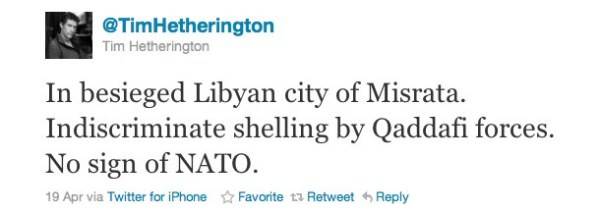
Hundreds of Libyans are reported killed in clashes between rebel forces and the Libyan army in the city of Misurata – a conflict that international press is working hard to keep in the light of international attention over the past several weeks.
Today news has emerged that one member of the press has lost his life in the conflict. Tim Hetherington, taking photos for Getty, was among a group of press struck by fire from Libyan forces. Two of Hetherington’s colleagues are in grave condition. Why are we writing about this tragic event on a technology blog? Because I thought it was notable that in the long history of war reporters risking their lives to tell terrible but important stories, we now know some of Hetherington’s final thoughts before his life ended. Not because he filed a story with the news wires, not because his photos were published in the newspaper, but because he had access to a lightweight public messaging system on the iPhone he carried in his pocket: Twitter.
Twitter has done many things in its short time on the web. That it provides a new way for people like Hetherington to give quick status updates from the field and for the rest of us to have immediate access to them is of historic significance.
Hetherington’s final message was a concerned, self-aware and public assessment of a dangerous situation. An infrequent publisher on the platform, Hetherington’s prior message had been a link to a photo of himself dressed up at the Oscars with friends.
Hetherington didn’t use Twitter when he was reporting from Afghanistan for Vanity Fair in 2007 and 2008, an assignment that led to his directing an Oscar nominated film called Restrepo. He created his Twitter account in July of 2010 and posted 53 times, often to share his thoughts about the nature of war and the media that covered it.
Rest in Peace, Mr. Hetherington.

















